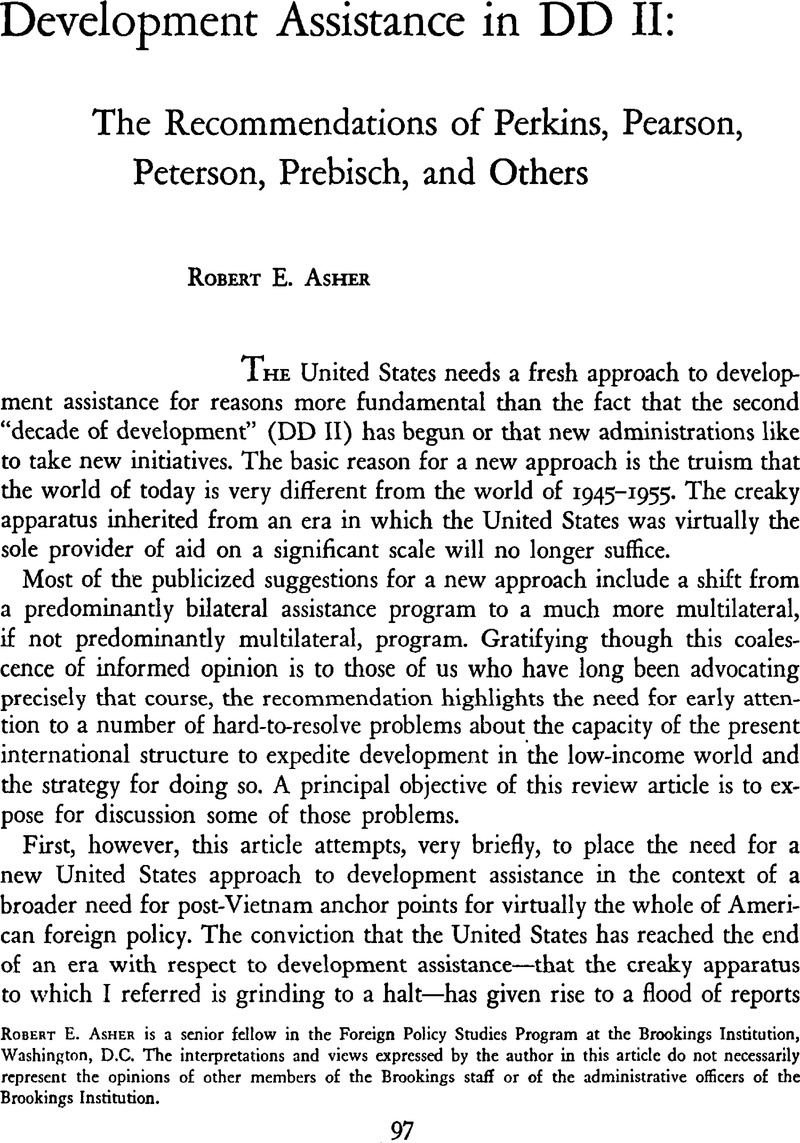Article contents
Development Assistance in DD II: The Recommendations of Perkins, Pearson, Peterson, Prebisch, and Others
Published online by Cambridge University Press: 22 May 2009
Abstract

- Type
- Review Essay
- Information
- Copyright
- Copyright © The IO Foundation 1971
References
1 See, inter alia, International Dependency in the 1970's, a pamphlet produced, according to its inside cover, in February 1970 “by the Africa Research Group [P.O. Box 213, Cambridge, Mass.] with the active assistance of the Pacific Studies Center and the Committee of Returned Volunteers.” Following this is a three-word sentence containing a lovely Freudian misprint: “All rights reversed.” The pamphlet bears a picture of Robert S. McNamara, president of the IBRD, on its cover and features an article entitled “Multilateralism: The Highest Form of Dependency.” The article strongly attacks what it rightly identifies as a major theme of the reports advocating aid policies for the seventies—multilateralism:
Multilateralism reflects the desire of American business to stabilize the situation by creating a kind of aid cartel among the capitalist powers. Through this type of partnership the developing country can be isolated and its bargaining power vis-a-vis the capitalist world greatly weakened. [P. 22.]
2 Assisting Development in Low-Income Countries: Priorities for U.S. Government Policy, A Statement on National Policy by the Research and Policy Committee (New York: Committee for Economic Development, 09 1969), p. 11Google Scholar.
3 U.S Foreign Assistance in the 1970s: A New Approach, Report to the President from the Task Force on International Development (Washington: Government Printing Office, 03 1970), p. 37Google Scholar.
4 Asher, Robert E., Development Assistance in the Seventies: Alternatives for the United States (Washington: Brookings Institution, 1970), pp. 84–90Google Scholar.
5 Partners in Development, Report of the Commission on International Development, Pearson, Lester B., chairman (New York: Frederick A. Praeger, 1969), p. 147Google Scholar.
6 U.S. Foreign Assistance in the 1970s: A New Approach, p. 22. Italics added.
7 Partners in Development, p. 215.
8 Prebisch, Raúl, Change and Development: Latin America's Great Task., Report to the Inter-American Development Bank, p. 143Google Scholar. (Mimeographed.)
9 A Study of the Capacity of the United Nations Development System (UN Document DP/5) (Geneva: United Nations, 1969), Vol. I, p. iiiGoogle Scholar.
10 In the trenchant, somewhat hyperbolic language of Harry G. Johnson:
From a cynical point of view, the World Bank has promoted eight nationally eminent men into eight world statesmen, and they have reciprocated by promoting the Bank into a major institution of world government. This is all very well for the Bank, and would probably be good for the world too. But it all depends on the citizenry of the rich nations accepting the commitment to move towards a world fiscal system of income redistribution by accepting much enlarged contributions by their governments to development assistance. Their reluctance to do so is what the aid crisis is about. … the Report provides no stirring appeal to men in rich countries to accept and welcome the transcendence of nationality by humanity; nor could it have done so without attacking the nation as the basic unit of human organization in the modern world. [”Pearson's ‘Grand Assize’ Fails,” Round Table, winter 1970 (No. 237), pp. 24–25Google Scholar.]
11 The Soviet Union participated in the Bretton Woods conference at which the IBRD and the International Monetary Fund (IMF) were born. However, it never joined the IMF and membership in it is, for better or worse, a prerequisite for membership in the IBRD. Yugoslavia is the only Communist member of the IBRD-IMF complex.
12 Hamilton, Edward K., “Toward Public Confidence in Foreign Aid,” World Affairs, 03 1970 (Vol. 132, No. 4), p. 296Google Scholar.
13 Partners in Development, pp. 228–229.
14 McNamara, Robert S., “Address to the Board of Governors,” Washington, 09 29, 1969, p. 22Google Scholar.
15 A Study of the Capacity of the United Nations Development System, Vol. I, p. 21.
16 Ibid., pp. 20–21.
17 Ibid., p. 26.
18 Change and Development, Latin America's Great Task, pp. 144–145.
19 UN Document ST/ECA/128 Committee for Development Planning, Report on the Sixth Session), paragraphs 92–99, pp. 41–44.
20 “International Development Strategy for the Second United Nations Development Decade,” General Assembly Resolution 2626 (XXV) of October 24, 1970, devotes five paragraphs to arrangements for the review and appraisal of objectives and policies. While they envisage roles of some sort for the Committee on Development Planning, the UN Secretariat, ECOSOC, and the General Assembly, the paragraphs are among the vaguest in this lengthy, landmark resolution (in which, it must be added, many of the seemingly more specific commitments are substantially qualified in the formal reservations, interpretations, and observations made by delegations).
21 Partners in Development, p. 58. See also Development Assistance: Efforts and Policies of the Members of the Development Assistance Committee (Paris: Organisation for Economic Co-operation and Development, 12 1969), pp. 214–216Google Scholar.
22 Fried, Edward R., “International Liquidity and Foreign Aid,” Foreign Affairs, 10 1969 (Vol. 48, No. 1), pp. 139–149CrossRefGoogle Scholar.
- 4
- Cited by




